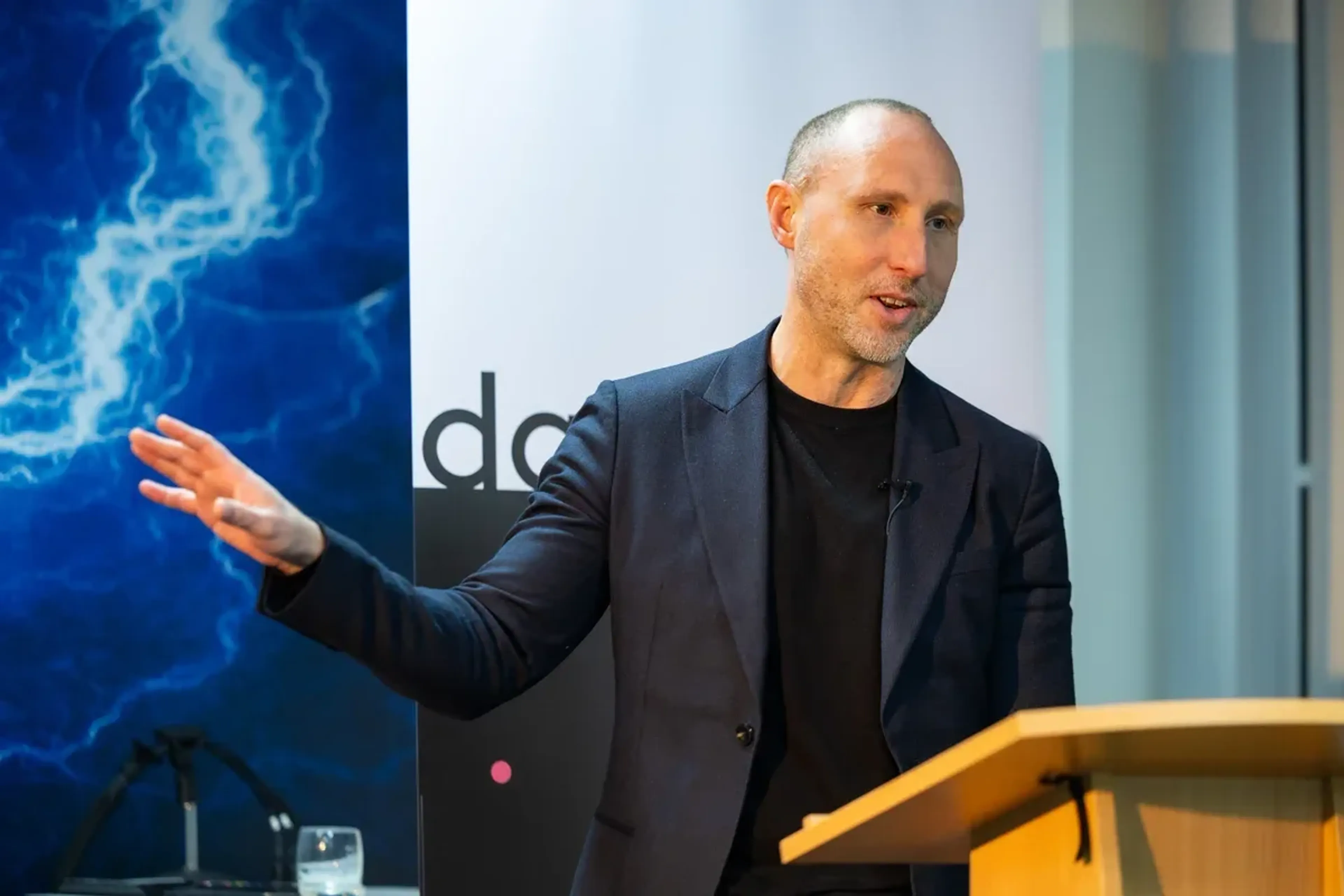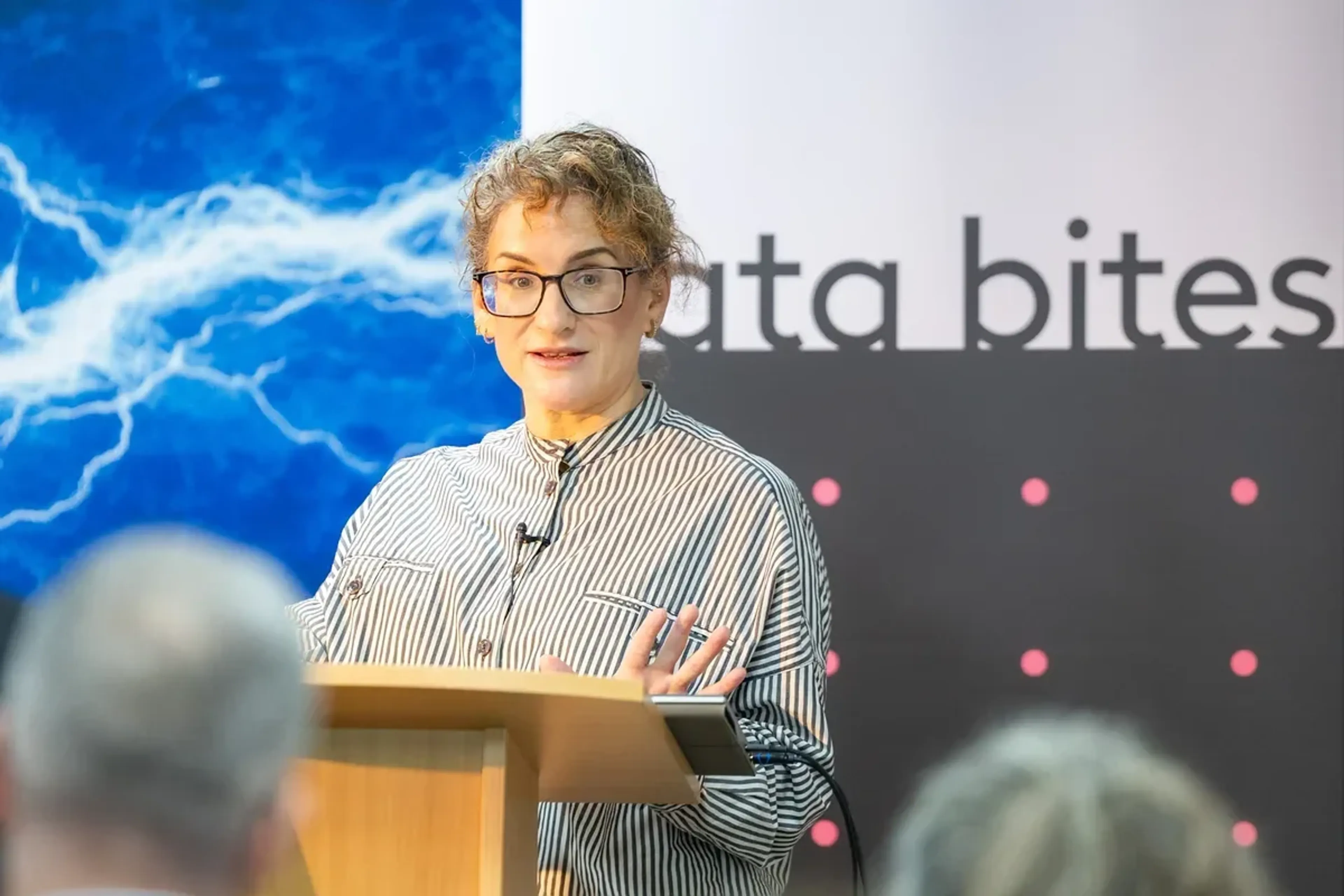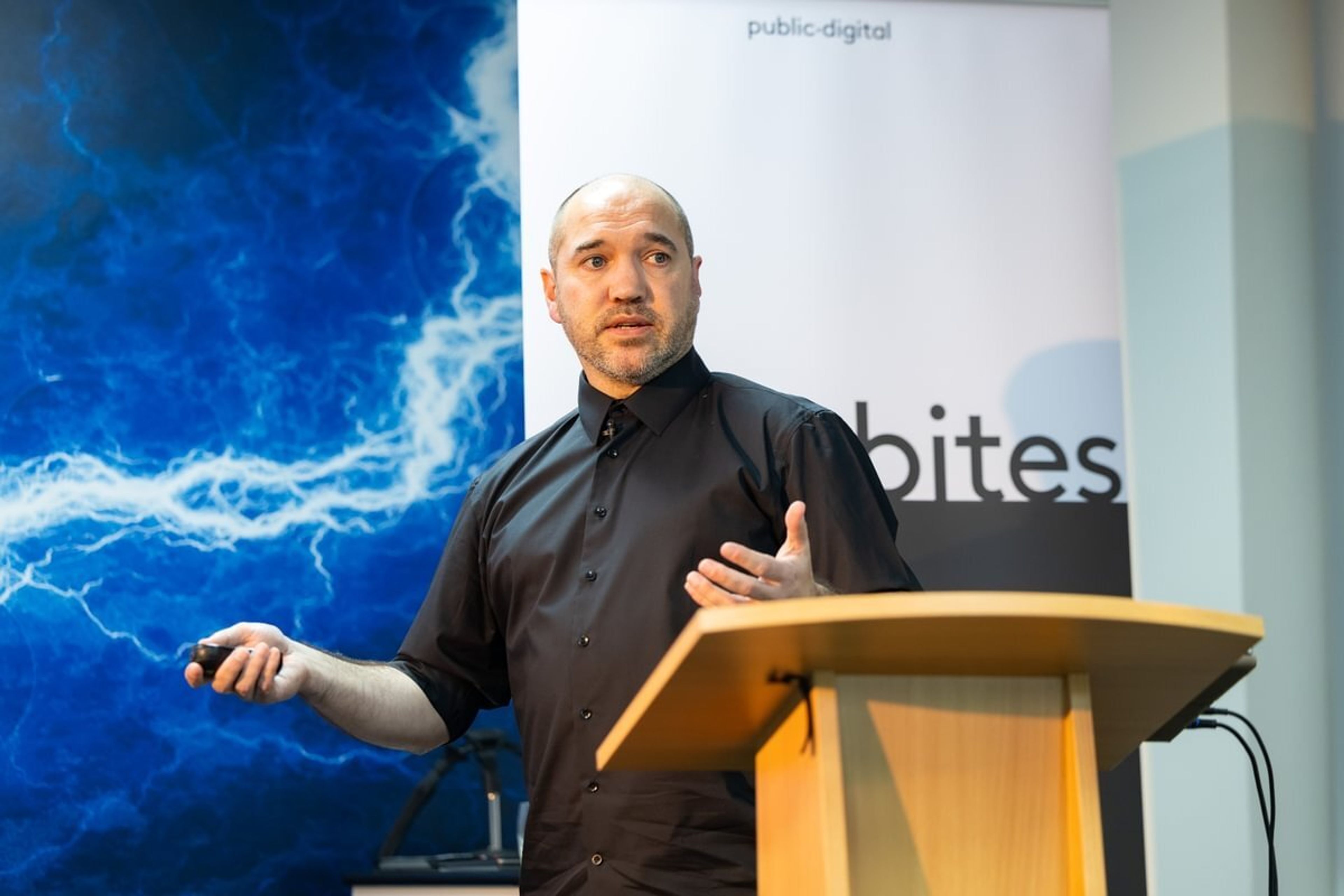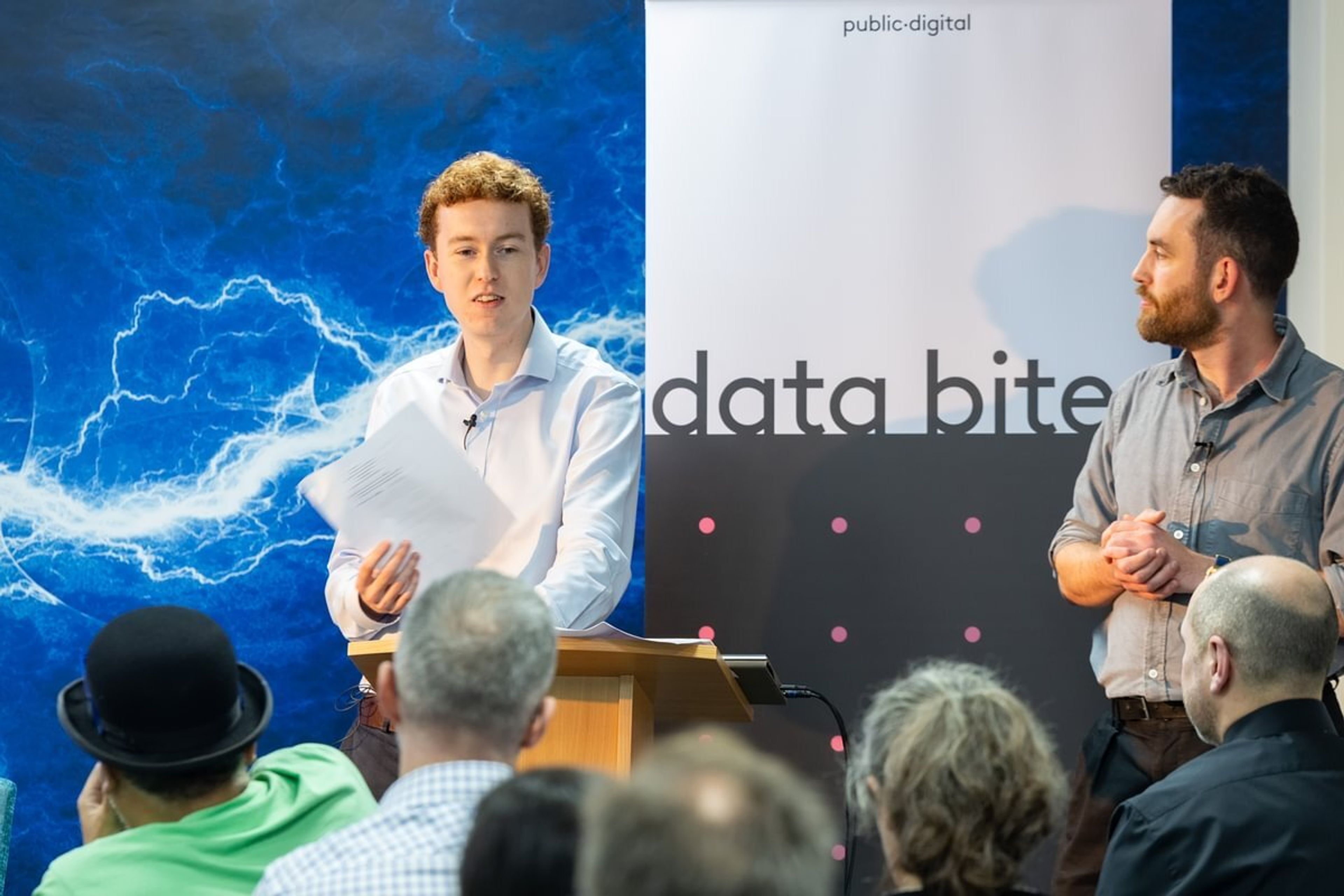Data Bites #50
Forget certain election results – the most momentous event recently was the return of Data Bites on Wednesday 6 November, and its move from the Institute for Government to a new home with Public Digital.
It was the 50th edition of a series that started back in April 2019 – there was even a cake to celebrate the occasion.
See the recording below or listen to it on SoundCloud.
Data Bites is a monthly meet-up designed to showcase interesting data projects in and around the public sector. Four brilliant speakers each get eight minutes to present – there are eight bits in a byte, hence eight minutes in a Data Bite – followed by eight minutes of Q&A.

Craig Suckling on whole of system change for data sharing
Our first speaker on the night – the 200th speaker across the whole series – was government chief data officer, Craig Suckling, from the Central Digital and Data Office. (Long-time Data Bites fans – I’m told some do exist – may remember Data Bites 16 where I looked forward to this appointment.)
Craig argued that data is one of the government’s most underutilised assets and can unlock economic growth, transform public service experiences for citizens and increase public sector productivity and drive cross-government collaboration. To make the most of such a national strategic asset, we need to tackle culture, incentives, skills, technology, trust and coordination.
Craig also covered similar themes in a recent blogpost.
See Craig's slides and highlights from his presentation here and here.

Nicola Fulton on the forthcoming UK Statistics Assembly
After giving a brief overview of the UK statistical system, Nicola – deputy head of external affairs for the Office for National Statistics – talked about the forthcoming UK Statistics Assembly. This followed a recommendation in the recent Lievesley Review into the UK Statistics Authority. The Assembly will take place in January and will bring together users and producers of data and statistics to come together and discuss (and advise on) priorities, gaps and user needs of the UK statistics system.
You can still register to attend the Assembly, which takes place (in London and online) on 22 January 2025. One of Nicola’s ONS colleagues also shared a link to a series of webinars from the ONS on ‘bringing data to life’.
We also ask our speakers – if they have time! – to answer a standard set of questions. Here are Nicola’s answers:
Can you summarise your project in a few sentences? The Assembly is an opportunity to bring together a broad range of participants for a day to discuss user needs, data gaps, and the challenges and opportunities confronting the statistics ecosystem.
What problem are you trying to solve? It'll help inform strategy and statistic producers planning across the statistics and data ecosystem.
What difference will it make to citizens? Official statistics and data provide vital insights that help citizens, businesses, policymakers and civil society plan for the future, make decisions and understand our society and economy better. So it is important these sectors all have a voice and can advise on what’s needed.
- How will you know when it’s succeeded? Success will include:
High and diverse representation at the Assembly from across sectors - public, private, charity, and regions of the UK, and the types of participants who we hear from (ie policymakers, service planners, community and business representatives, as well as data analysts, statisticians, economists and demographers taking part).
The event, the advisory report and actions are cross-cutting and relatable across statistical system.
Learnings from the Assembly and its process can inform and help make future assemblies and engagement more impactful.
What are the main hurdles? We’re aiming for broad representation at the Assembly from all sectors and regions of the UK. This is the first time a Statistics Assembly has been held, so we're building and learning as we go.
If you could change one thing about data in government, what would it be? A cross govt data change from me rather than ONS would be for ongoing collaboration across government and agencies around efforts to build public trust in the use of data for public good.
See Nicola's slides and highlights from her presentation here.

Ryan Dunn on developing a value framework for decision making with data
Ryan, head of insight and analytics at DWP Digital, talked about the ‘hub and spoke’ operating model suggested by the DWP Data Strategy: there should be a data hub to develop and manage consistent policies and practice, while data practitioners should also be embedded in different teams (the spokes) working with data in context, and closer to content teams. The value framework should help link consistency and context in thinking about the value of different metrics and measures of experience, expenditure, efficient and effectiveness.
See Ryan's slides and highlights from his presentation here.

Philip Nye and Finn Baker on the IfG Ministers Database
Philip and Finn, senior data scientist and research assistant respectively from the Institute for Government, presented the IfG’s new database of all government ministers since 1979. The database includes information about who served in what roles between what dates, allowing users to look up the ministerial roles held by a minister, all the people to have held particular roles, or the composition of a government on any date or changes to it between two dates. They talked about what had been involved in pulling the data together and building the resource, and encouraged others to use it – including being able to access all the data themselves.
As well as the database itself, there’s a GitHub repository and a blogpost which launched the project.
Here are Philip and Finn’s answers to our questions:
Can you summarise your project in a few sentences? The IfG Ministers Database holds details of all ministerial appointments from 1979 onwards. It’s a key research resource for the Institute for Government, which we recently turned into a public resource.
What problem are you trying to solve? Internally, we use it to answer lots of questions on topics like ministerial churn and gender balance, and carry out broader research into ministerial careers. By turning it into a public resource we’re making it easier for other people to answer questions that are otherwise quite hard to answer – such as who all the holders of a particular post have been, or who was in government on a particular date.
What difference will it make to citizens? It’s already used by lots of journalists (especially around reshuffles) and academics. We hope that, by turning it into a public resource, there will be more – and more informed – discussion of topics we care a lot about at the IfG such as ministerial churn.
How will you know when it’s succeeded? It’s only part of the picture, but in terms of quantifiable measures we’ll be paying attention to usage numbers, and citations either by journalists or academics.
What are the main hurdles? Producing a public resource like this has been quite a new thing for the IfG. We’re happy with how it’s gone, but it’s definitely been a learning curve. Picking tech that makes it easy to maintain was probably the most important thing to get right.
If you could change one thing about data in government, what would it be? From a personal perspective, as a data scientist working with lots of government data there’s a massive range in the availability and usability of data that departments publish. The Department for Education does things very well – I [Philip] would love it if more departments levelled up with the standard they set.
See Philip and Finn's slides and highlights from their presentation here and here.
If you’d like to present at a future Data Bites, or would like to recommend someone, please get in touch!
Photos by Paul Clarke.